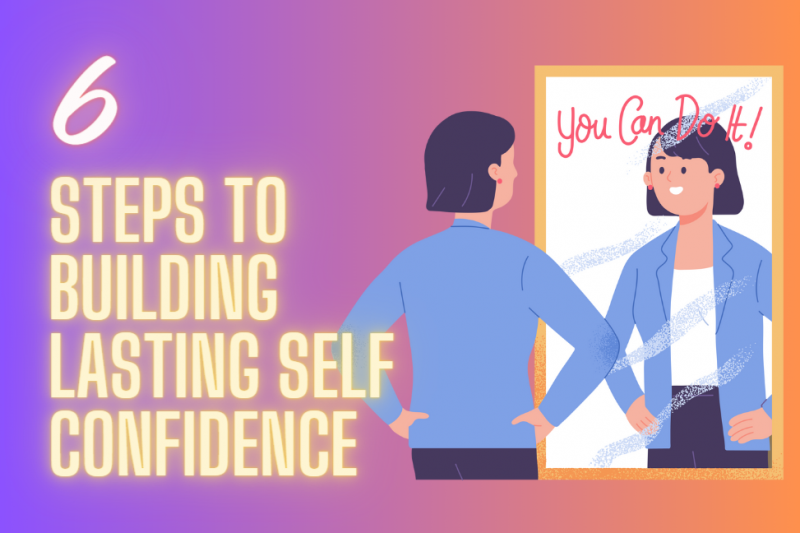Introduction
You’re ready to change, and it all starts with believing in yourself.
Dive into these 9 actionable steps to boost your confidence daily.
From acknowledging your wins to pushing beyond your comfort zone, you’ll learn how to empower yourself and walk taller.
Embrace the journey of self-improvement; it’s time to shine.
Let’s begin this transformative process together—you’re not just surviving each day; you’re thriving.
Welcome to your new, more confident life.
Acknowledge Your Achievements
Regularly recognizing your own accomplishments, no matter the scale, is crucial for bolstering your self-confidence. Taking stock of your successes, or creating a success inventory, isn’t just about patting yourself on the back. It’s an exercise in realizing your growth and the strength of your capabilities. When you reflect on what you’ve achieved, known as achievement reflection, you’re not only acknowledging the past but also fueling your future endeavors.
You’ve got to make it a habit. Start your day by listing three small wins from yesterday. Did you tackle a difficult task at work? Perhaps you finally committed to a morning run. These are victories, and they count. It’s the accumulation of these moments that builds a resilient self-image.
Don’t overlook the learning experiences either. Every challenge you’ve faced has contributed to your skill set. When you hit a setback, ask yourself, ‘What did I learn?’ This shifts your perspective from failure to growth, reinforcing the belief that you’re always moving forward.
Practice Self-Compassion
As you add to your success inventory, it’s equally important to weave self-compassion into the fabric of your daily routine, treating yourself with the same kindness you’d offer a good friend. Cultivating an attitude of self-compassion isn’t just a feel-good suggestion; it’s a pivotal aspect of building unshakeable confidence.
Start by establishing self-kindness rituals. These could be as simple as allocating time for a relaxing bath, a leisurely walk, or even a few moments of deep breathing amidst a hectic day. It’s about creating intentional spaces in your life where the primary goal is to nourish and affirm your well-being.
Forgiveness exercises play a critical role in practicing self-compassion. Recognize that you’re human and mistakes are part of the learning curve. When you stumble, pause and offer yourself a few words of understanding, rather than harsh criticism. Maybe write a letter of forgiveness to yourself or list the lessons learned, transforming setbacks into stepping stones.
Set Realistic Goals
Establish clear and achievable goals to steadily enhance your confidence through tangible successes. Setting goals that are within your reach prevents the discouragement that comes from falling short of too-lofty aspirations. Begin with small, manageable objectives that build the foundation for more complex achievements. This strategy fosters a sense of accomplishment that bolsters your self-assurance with every step forward.
Implement goal visualization as a powerful tool. Picture yourself succeeding, imagine the steps it takes to get there, and feel the satisfaction of reaching your target. Visualization not only increases motivation but also prepares your subconscious for the journey ahead, making the process feel more familiar and less daunting.
Don’t forget the importance of progress tracking. Keeping a record of your advancements validates the effort you’re putting in and illuminates the path to your final goal. It’s a concrete method to see how far you’ve come, and it provides a boost to your confidence each time you tick off a milestone. This isn’t just about celebrating big wins; it’s also recognizing and taking pride in the small victories along the way. With each goal you meet, you’ll prove to yourself that you’re capable, and that’s the essence of growing confidence.
Embrace Positive Affirmations
Building on your established goals, you’ll find that incorporating positive affirmations into your daily routine can significantly reinforce your burgeoning confidence. These affirmations are concise, powerful statements that, when spoken with conviction, can reprogram your mind, shifting your focus from negativity to a belief in your inherent worth and abilities.
Affirmation consistency is key. Repeating your chosen phrases daily ingrains them into your subconscious, slowly altering your pattern of thought. You’re not just saying words; you’re cultivating an environment where positive self-talk becomes your norm, and the impact of this self-talk on your confidence can’t be overstated.
Imagine starting your day by asserting, ‘I am capable and strong,’ or ‘I overcome challenges with ease.’ This isn’t just feel-good chatter; it’s setting the tone for your day and your mindset. You’re telling yourself that you’re ready to face whatever comes your way with a grounded sense of self-assurance.
Cultivate a Growth Mindset
Transitioning from positive affirmations, you’ll find that adopting a growth mindset amplifies your confidence even further. A growth mindset fosters the belief that you can develop abilities through dedication and hard work. This learning attitude is the bedrock upon which you can build a strong, resilient sense of self. Here’s how to cultivate it:
- Acknowledge Your Progress: Recognize and celebrate every small win. This reinforces the mindset shift that you’re evolving, not just spinning your wheels.
- Embrace Challenges: See obstacles as opportunities. Each challenge is a chance to grow and improve, not a dead end.
- Learn from Criticism: Instead of taking it personally, filter and apply constructive feedback. It’s a valuable tool for your personal and professional development.
- Persist in the Face of Setbacks: Understand that setbacks are part of the learning process. Keep a learning attitude, and don’t let failures define you.
Master Your Body Language
Mastering your body language is a powerful step toward projecting and reinforcing your growing confidence. Your nonverbal communication often speaks louder than your words, revealing your true feelings and affecting how others perceive you. By harnessing the strength of power poses, you can instantly boost your self-assurance.
Power poses are expansive, open stances that occupy space and command presence. Think of a superhero standing with hands on hips or a CEO with feet up on the desk. These positions increase your testosterone, the hormone associated with dominance, and decrease cortisol, your stress hormone. It’s not just about feeling powerful; it’s about signaling it to the world too.
When you’re in a challenging situation, take a moment to adjust your posture. Stand tall, pull your shoulders back, and breathe deeply. This isn’t just for show; it physiologically calms you, making you feel more in control. Your nonverbal cues then start to align with a confident mindset.
Expand Your Comfort Zone
To elevate your confidence, it’s crucial you push beyond the familiar boundaries of your comfort zone. Challenging these boundaries isn’t just about taking risks; it’s about intentional growth. Each time you step into the unknown, you’re building your self-assurance, brick by brick.
Here’s how you can start:
- Identify Your Fears: What’s holding you back? Write them down and face them one by one.
- Start Small: Don’t leap; take baby steps. Choose one thing that makes you slightly uncomfortable and tackle it.
- Celebrate Wins: Each time you conquer a fear, no matter how small, celebrate. This reinforces your belief in your abilities.
- Seek New Experiences: Actively look for opportunities to try something different. Whether it’s a new route to work or a cooking class, variety is the spice of life—and confidence.
By expanding your comfort zone, you’re not just challenging boundaries; you’re redefining them. And with every new experience, you’ll find your self-confidence growing.
Celebrate Small Victories
Recognizing your small wins each day boosts your confidence and motivates you to keep progressing. It’s easy to overlook the little achievements when you’re focused on a big goal, but it’s the small steps that pave the way to success.
Start by practicing victory journaling. Each evening, jot down at least one thing you did well that day. It could be as simple as completing a task you’ve been putting off or as significant as handling a difficult conversation with grace.
This habit not only serves as a reminder of your daily accomplishments but also helps you see the pattern of progress you’re making over time. Moreover, it allows you to reflect on your strengths and the strategies that are working for you.
Don’t forget to reward yourself, too. Establish a system of incremental rewards that acknowledge the effort you’re putting in. It might be a small treat for finishing a report or a relaxing walk after a productive meeting. These rewards will give you something tangible to look forward to and reinforce the positive behaviors that are building your confidence.
Surround Yourself With Positivity
Building on your momentum of celebrating small victories, it’s crucial to immerse yourself in a positive environment that reinforces your growing confidence. The people and the atmosphere around you can significantly impact your self-esteem and outlook on life. Here’s how to ensure you’re surrounded by positivity:
- Choose Your Company Wisely: Spend time with friends and family who uplift you. Positive influences can be infectious, and being around those who believe in you can empower you to do the same for yourself.
- Create an Optimistic Environment: Decorate your space with motivational quotes and images that inspire you. An environment that radiates positivity can serve as a constant source of encouragement.
- Consume Uplifting Content: Be selective about the books you read, the shows you watch, and the social media you engage with. Aim for content that fuels your positivity and avoids negativity.
- Practice Positive Self-Talk: Remind yourself of your strengths and accomplishments. Replace self-doubt with affirmations that reinforce your confidence.
Frequently Asked Questions
How Do I Rebuild My Confidence After a Significant Personal or Professional Setback?
Rebuilding your confidence after a setback starts within. You’ve got to embrace reflective journaling to process your experiences. Write down your thoughts, feelings, and lessons learned.
It’s also crucial to visualize your success. Imagine achieving your goals vividly; feel the triumph. This practice can reignite your self-belief.
Keep pushing forward, and don’t let a stumble define you. You’re resilient, and each day, you’re getting stronger and more confident.
Keep at it!
Can Too Much Confidence Negatively Impact My Personal or Professional Relationships, and How Do I Find the Right Balance?
Yes, too much confidence can sometimes strain your relationships. Overconfidence pitfalls include appearing arrogant or dismissive.
To avoid this, practice confidence moderation. You’ve got to listen actively and value others’ contributions. It’s about striking a balance—being assertive but not overbearing.
Check in with yourself regularly to ensure you’re not crossing that line. Remember, genuine confidence doesn’t need to overshadow others to shine.
How Do I Deal With Imposter Syndrome, Especially When I’m in a New Role or Taking on New Responsibilities?
You’re tackling imposter syndrome head-on by first acknowledging it exists. Overcoming doubt is key. Start by visualizing your success in this new role or with fresh responsibilities. Remember, you’ve earned your place.
Keep track of your achievements, however small, and use them as reminders of your capability. Seek feedback, learn continuously, and connect with mentors.
With each step, you’ll see your confidence grow, proving you’re not an imposter but a valuable contributor.
Is There a Difference in Building Confidence Between Introverted and Extroverted Individuals, and How Should Each Type Approach It?
Yes, there’s a difference in building confidence between introverted and extroverted individuals due to varying personality traits.
You, as an introvert, might prefer solitary confidence techniques, like journaling or meditation.
If you’re extroverted, you may thrive on social interactions and public speaking practice.
Regardless of your type, it’s crucial to find methods that resonate with you and incorporate them into your routine to bolster your confidence effectively.
How Do I Maintain My Confidence When Faced With Constant Criticism or Negativity From Others, Such as in a Toxic Work Environment?
When you’re bombarded with criticism or negativity, it’s crucial to develop a ‘Criticism Shielding’ strategy. Start by not taking harsh words personally; understand that feedback often says more about the giver than you.
To maintain your confidence, focus on ‘Resilience Cultivation.’ Build a supportive network, affirm your strengths, and remember your achievements. Constant self-encouragement can help you stay confident and weather a toxic environment without internalizing the negativity.
Conclusion
You’ve made strides by acknowledging your achievements and practicing self-compassion. Setting realistic goals has kept you grounded, while positive affirmations and a growth mindset have propelled you forward.
Mastering your body language has boosted your presence, and stepping beyond your comfort zone has unveiled new strengths. Cherish every small victory; they’re your stepping stones to confidence.
Surround yourself with positivity, and you’ll find your confidence doesn’t just grow—it soars. Keep empowering yourself every day.





